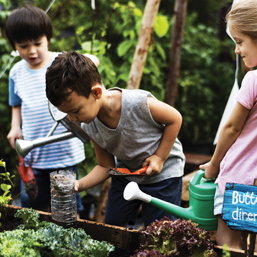
Contact with nature is essential in our day-to-day lives. It connects us to ourselves and each other and increases our physical and emotional health; our overall personal and social development is dependent on contact with nature. “Canadians experience adversity when they disconnect from nature because, as a species, humans quite simply cannot thrive in a built environment. We need contact and interaction with nature - period.” Canadian Parks Council
In 2015, the Oxford Junior Dictionary removed 50 nature words from its publication, such as beaver, acorn, lark, mussel, otter, magpie, and heron, and added more modern words, such as blog, chat room, cut and paste, and broadband. This shows more evidence of a continued trend of people, especially children, spending less time out in their natural world. The literature suggests that unstructured outdoor play, with its inherent risks, is essential for childhood education and development. Despite this, children are spending less time participating in outdoor play than ever before. Their days are filling up with scheduled, structured, indoor, sedentary activities, and because of this decline in natural play, we are seeing a decline in children’s wellbeing. Obesity rates, anti-social behavior, vitamin D deficiency, depression, vision problems, and rates of behavior-modifying drugs in children are on the rise.
So, what can we do about it? Get our kids back outside!
When we move children to outdoor programs, they display enhanced observational skills, improved concentration (especially those with attention deficit disorder), greater recovery from cognitive fatigue, and improved fine motor skills. Children’s stress levels fall within minutes of seeing green spaces, there is an immediate calming effect, and a reduction in aggressive or bullying behavior. Access to nature facilitates social development, connection and wellbeing, supports innovation and imaginative play, and inspires collaborative play. Research has shown that children who spend regular time outdoors are more creative, better problem solvers, have improved focus, are more resilient, disciplined, and better at handling stress later in life.
When kids are free to play in nature, they engage all their senses - it provides an incredibly rich learning environment that can never be replicated in an indoor, structured setting. Natural spaces are dynamic, changing, complex places to explore, create, and learn that can’t be mimicked by a built environment. Being outdoors helps build compassion, kindness, improves social bonds and relationships, and allows children to feel lighter and happier. After 18 months of Covid, uncertainty, and isolation, children are desperate for connection, and the natural world provides a fantastic, safe way to do this.
We know that when kids are outside, they move more, sit less, and play longer. When children engage with and learn about nature, they begin to love and appreciate it. It’s hard to create young champions for our natural world when kids have no experience with it. Nature is hands-on - playing in the dirt, building forts, climbing trees, examining bugs - and offers stimulation for the mind and senses for much longer than static play structures. Programs that offer unstructured, outdoor play are particularly beneficial because kids can direct their own play; they can imagine and create the way they wish.
When you are looking for an outdoor program for your child, look at what kind of natural environment the program offers. Are there lots of trees or shrubs? Are there places for the children in the program to engage with risky play: heights, hide-a-way spots? Is there a difference in terrain: sand, gravel, grass, hills? Do they have loose parts, either natural or synthetic, for the kids to play with that can spark their imaginations? The more diverse the environment, the more engaging it can be. Is there time during the program for children to engage in free play, time to explore and get curious about their natural world? Also, look at the type of training and experience the staff have: play training, nature-based learning, forest school training, etc. Outdoor programs, particularly unstructured, are vastly different than your traditional indoor program; it takes particular skills to help engage and inspire but not lead the children in play and offer them an opportunity to encounter and overcome healthy risks.
If I were to ask you to think back to your most fond play memory as a child, chances are it would have been outdoors, with your peers, away from the rules and guidance of adults. Children today aren’t being offered the opportunity to freely play and explore their natural world as the generations before them, and we are seeing this manifest in their declining health. By keeping kids inside, we are risking their cognitive and emotional development. Let’s get back outdoors, for our children’s health, our health, and our planet’s health.
Sarah has a Bachelor of Physical Education from the University of Alberta and was the supervisor for The City of Calgary’s Mobile Adventure Playground. As the owner of Playful Adventures, she is passionate about bringing back unstructured, loose parts, outdoor play. Reach her at This email address is being protected from spambots. You need JavaScript enabled to view it..
Calgary’s Child Magazine © 2025 Calgary’s Child